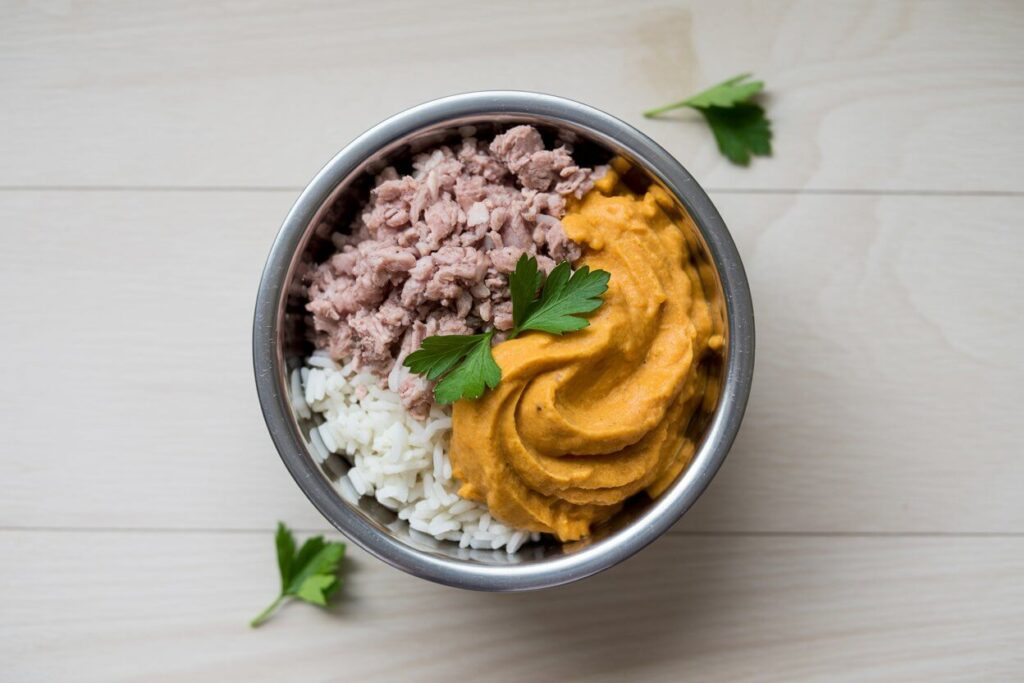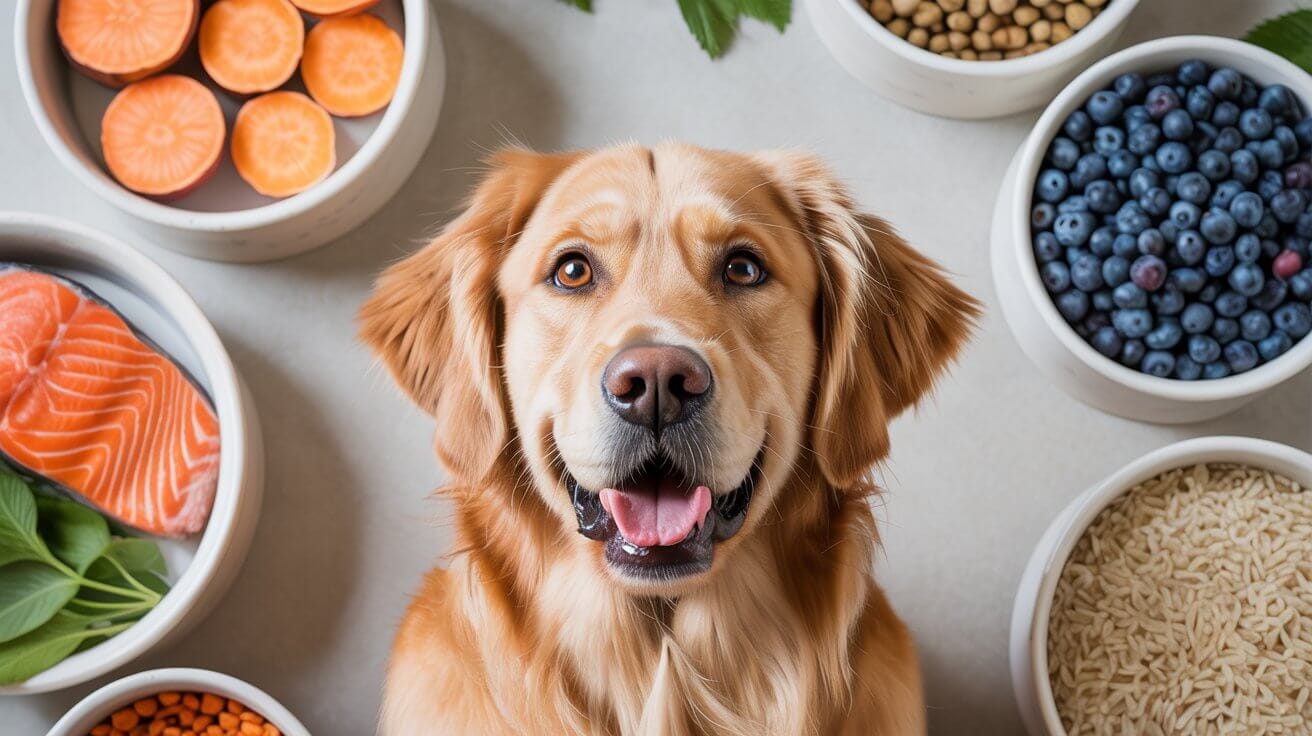Cleaning up another mess at 2 AM. Worrying every time my French Bulldog, Gus, skipped a meal. I have been there. As a certified professional dog trainer and a fellow dog parent I’ve seen that same look of frustration and concern in so many owners. And I’ve felt it myself. What many owners don’t realize is that digestive issues often go hand-in-hand with skin problems, which is why I’ve also created a comprehensive guide to managing skin allergies through nutrition.
You’re not just looking for a product; you’re looking for peace of mind. Finding the best dog food for a sensitive stomach can feel impossible, but it doesn’t have to be. This guide is built from my personal and professional experience to give you clear, straightforward answers and help you get your dog feeling happy and healthy again.
Smarter Paws Academy is reader-supported. When you buy through links on our site, we may earn an affiliate commission at no extra cost to you. As an Amazon Associate, I earn from qualifying purchases. Thank you for your support!
Important Health Disclaimer
The information in this article is for educational purposes only and is based on my personal and professional experience as a certified dog trainer. It is not a substitute for professional veterinary advice. Please consult your veterinarian to diagnose any health issues and before making any significant changes to your dog’s diet.
Quick Tips: What to Look for in the Best Dog Food for a Sensitive Stomach
- Look for Digestible Proteins: Prioritize foods with named, gentle proteins like lamb, turkey, or salmon as the first ingredient.
- Avoid Common Allergens: Steer clear of foods that rely heavily on corn, wheat, and soy, which can trigger digestive upset in sensitive dogs.
- Transition Slowly: Always introduce a new food gradually over 7-10 days to allow your dog’s digestive system to adjust.
Prefer to Listen? An Audio Overview
For a conversational deep dive into this topic, press play below for the complete audio discussion with our hosts.
Runtime: 1 minute 40 seconds
View Full Audio Transcript
Narrator: Welcome to the Smarter Paws Academy audio overview. Today, Sandie is breaking down one of the most common challenges for dog owners: finding the right food for a sensitive stomach. Sandie, what’s the first thing owners need to know?
Sandie Calloway: Thanks for having me. The most important thing is to recognize the signs. It’s not just about vomiting or diarrhea. Excessive gas, a consistently loose stool, or even an itchy, dull coat can all be signs that your dog’s food isn’t agreeing with them.
Narrator: That’s a great point about the skin and coat. So, when owners are looking at food labels, what are the key ingredients they should be looking for?
Sandie Calloway: You want to look for simple, high-quality ingredients. The protein should be a single, easily digestible source like lamb, turkey, or salmon. For carbs, gentle options like rice, oatmeal, and pumpkin are fantastic. And a huge bonus is the inclusion of probiotics, which are the “good” bacteria that support a healthy gut.
Narrator: What about wet food versus dry kibble? Is one better than the other?
Sandie Calloway: The quality of the ingredients is much more important than the format. Wet food has more moisture, which can help with digestion, but a high-quality, specialized dry kibble can be just as effective and is great for dental health. The key is to avoid common allergens like corn, wheat, and soy, and to transition to any new food very slowly over 7 to 10 days.
Narrator: That makes perfect sense. Thanks so much for the clear advice, Sandie.
Sandie Calloway: My pleasure. I hope it helps owners find some peace of mind and helps their dogs feel much better.
Table of Contents
What is the Easiest Food for a Dog to Digest?
This is the question I get most often from worried owners. The answer is simple: the easiest foods for a dog to digest are those made from simple, high-quality, and limited ingredients. Think of it like a clean, whole-foods diet for your pup.
Generally, this means a diet based on a single-source, easily digestible protein like lamb, turkey, or fish, paired with a gentle carbohydrate like white rice or pumpkin. The fewer complex ingredients and artificial fillers a dog’s system has to break down, the less likely it is to cause irritation.
Is Wet or Dry Food Better for Dogs with Sensitive Stomachs?
Many owners wonder if kibble can irritate a dog’s stomach. The truth is, the quality of the ingredients matters far more than the format (wet vs. dry). However, each has distinct advantages for a sensitive dog.
- Wet Food Pros: The high moisture content in wet food can make it easier to digest and is great for keeping your dog hydrated. It’s also often more palatable, which can entice a dog with a decreased appetite.
- Dry Food (Kibble) Pros: High-quality kibble formulated for sensitive stomachs is convenient, cost-effective, and helps clean a dog’s teeth through mechanical abrasion.
My Recommendation: Don’t get too hung up on wet versus dry. A premium, easily digestible kibble is far better than a low-quality canned food full of fillers. For some dogs, mixing a spoonful of wet food into their kibble can be the perfect solution, adding both moisture and flavor. This is especially true for young puppies, whose nutritional needs are unique.
Key Ingredients: What to Look For and What to Avoid
Navigating an ingredient label can feel overwhelming. Let’s break it down into a simple checklist.
The Best Proteins (Lamb, Salmon, Turkey)
When it comes to protein, “Is salmon or lamb better?” is a common question. Both are fantastic choices because they are considered “novel proteins” for many dogs, meaning they are less likely to have been exposed to them and developed an intolerance. The easiest protein for a dog to digest is one their body handles well. Look for named, whole proteins as the first ingredient.
Gut-Soothing “Superfoods” (Pumpkin, Rice, Sweet Potato)
Certain whole foods are renowned for their digestive benefits. As the comprehensive guide from the American Kennel Club explains, ingredients like pumpkin are a fantastic source of soluble fiber, which helps regulate digestion.
The Power of Probiotics
A healthy gut is teeming with beneficial bacteria. Probiotics are supplements that help maintain this healthy balance. As detailed by the Cornell University College of Veterinary Medicine, specific probiotic species can help normalize intestinal conditions and support the immune system. If your dog is experiencing skin issues along with digestive problems, our guide to the best dry dog food for skin allergies explores how probiotics can benefit both conditions.
| Ingredient Type | Look For (The Good Stuff) | Avoid (The Troublemakers) |
|---|---|---|
| Proteins | Named sources: Lamb, Turkey, Salmon, Duck | Vague terms: “Meat by-products,” Corn, Wheat, Soy |
| Supplements | Probiotics, Prebiotics, Omega-3s (Fish Oil) | Artificial Preservatives, Colors, or Flavors |
| Carbohydrates | Rice, Oatmeal, Barley, Sweet Potatoes | Excessive Fillers, Corn, Wheat |
Sandie’s Top Picks: Best Dog Foods for Sensitive Stomachs in 2025
After years of personal testing with my own dogs and recommending foods to clients, I’ve identified brands that consistently deliver excellent results. Here are my top choices, broken down by the specific problems they help solve.
Best Overall: Lamb & Oatmeal Formula
Why it’s my top pick: This is my go-to recommendation for a reason. Real lamb is the first ingredient, it’s fortified with live probiotics for gut health, and the oatmeal is incredibly gentle. It’s a science-backed powerhouse that consistently delivers great results.
Best for Diarrhea & Vomiting
Why it helps: When a dog’s system is really upset, simplicity is key. This is a veterinary-style bland diet in a can. The limited ingredients—just chicken and rice—are extremely easy to digest, helping to soothe the gut and get your dog back on track.
Best for Skin & Stomach Allergies
Why it’s a game-changer: For dogs with suspected allergies to common proteins like chicken or beef, a truly novel protein is essential. Wild kangaroo is a hypoallergenic, lean protein source that most dogs have never been exposed to, dramatically reducing the chance of a reaction.
Best Grain-Free Option
Why it’s a great choice: If you’re avoiding grains, this is a fantastic option. It uses cold-water salmon for digestible protein and Omega fatty acids, and pairs it with fiber-rich pumpkin and probiotics to support a healthy gut, all without any grains.
Best Wet Food Option
Why it works: This pâté is highly digestible and packed with moisture, which is great for sensitive systems. It uses high-quality chicken and includes prebiotic fiber to fuel good gut bacteria, making it a gentle and palatable choice for picky eaters or dogs who need extra hydration.
Can a Homemade Diet Help a Dog with a Sensitive Stomach?
Sometimes, a home-cooked meal is the best solution, especially for dogs with multiple allergies or extreme sensitivities. It gives you 100% control over every ingredient that goes into your dog’s bowl.
For dogs dealing with both digestive and skin issues, a homemade diet can be particularly effective. Our guide to managing skin allergies through nutrition offers additional insights into creating hypoallergenic meals that address both conditions.
However, I often recommend a simple, bland diet for dogs experiencing temporary upset, while a long-term homemade diet requires careful planning to be nutritionally complete.

My Go-To “Tummy Reset” Recipe
This is the recipe I use for my own Frenchie when her stomach is acting up. It’s simple, soothing, and highly digestible.
- 1 cup cooked lean ground turkey (boiled and drained of all fat)
- 1 cup cooked white rice
- 1/2 cup plain, canned pumpkin (ensure it’s 100% pumpkin, not pie filling!)
- 1 tablespoon of fish oil (for those amazing Omega-3s)
Instructions: Simply mix all the ingredients together and let it cool before serving.
Important Note: While this recipe is great for short-term relief, it is not a complete and balanced diet for long-term feeding. If you wish to pursue a permanent homemade diet, you must consult with a board-certified veterinary nutritionist to create a recipe that meets all of your dog’s specific needs.
Expert Tips for Managing Your Dog’s Diet
Beyond just the food, how you feed your dog can make a huge difference.
- Transition Slowly: When switching to a new food, do it gradually over 7-10 days. As nutrition experts at Tufts University recommend, a slow transition is key to identifying sensitivities and allowing your dog’s gut time to adjust.
- Use a Consistent Feeding Schedule: Feeding your dog at the same times each day helps regulate their digestive system.
- Does adding water to dry dog food help with digestion? Yes, it can! Adding a little warm water to kibble can make it softer, easier to chew, and more palatable, which can certainly help a dog with a sensitive mouth or stomach.
- Limit Treats: Treats should make up no more than 10% of your dog’s daily caloric intake. Choose simple, single-ingredient treats to avoid upsetting their stomach.
Frequently Asked Questions
Is sensitive stomach dog food good for diarrhea?
Yes, absolutely. High-quality sensitive stomach formulas are specifically designed to be easily digestible and often contain ingredients like pumpkin and probiotics, which help to firm up stool and soothe the digestive tract, making them an excellent choice for dogs with occasional diarrhea.
Are eggs, Greek yogurt, or cottage cheese good for dogs with sensitive stomachs?
In moderation, they can be. Scrambled eggs are a great source of easily digestible protein. Plain Greek yogurt and cottage cheese contain probiotics which can support gut health. However, some dogs are lactose intolerant, so introduce dairy slowly and in small amounts to see how your dog reacts.
What dog food is best for gassy dogs?
The best food for a gassy dog is one that avoids their specific trigger ingredients. Often, foods high in corn, wheat, soy, or certain proteins can cause excess gas. A limited-ingredient diet with a novel protein like duck or lamb is often a great place to start to reduce flatulence.
Is it okay to just feed my dog dry food?
Yes, as long as it is a high-quality, nutritionally complete and balanced dry food that is appropriate for your dog’s life stage, it is perfectly fine to feed only dry food. Just ensure your dog always has access to plenty of fresh water.
Is Royal Canin or Acana a good dog food for sensitive stomachs?
Both Royal Canin and Acana are reputable brands that offer high-quality options. Royal Canin has several veterinary-prescribed gastrointestinal formulas that are excellent for specific medical conditions. Acana is known for its high-protein, limited-ingredient diets that many dogs with sensitivities do very well on. The “best” one depends entirely on your dog’s individual needs and what ingredients they are sensitive to.
Can sensitive stomach issues cause skin problems in dogs?
Absolutely. The gut-skin connection is well-established in veterinary medicine. Poor gut health can lead to inflammation that manifests as skin issues like itching, hot spots, and dull coat. If your dog is experiencing both digestive and skin problems, addressing the gut health often improves both conditions. For more targeted information on skin issues specifically, see our comprehensive guide to the best dry dog food for skin allergies.
Finding Peace of Mind and a Happy Tummy
Choosing the right food for your dog’s sensitive stomach is a journey of patience and observation. Remember, you are your dog’s best advocate. By focusing on high-quality, digestible ingredients and working with your veterinarian, you can absolutely find a solution that ends the cycle of upset stomachs. The goal is not just to stop the symptoms, but to see your dog thrive with a happy gut, vibrant energy, and the peace of mind that comes with it.








